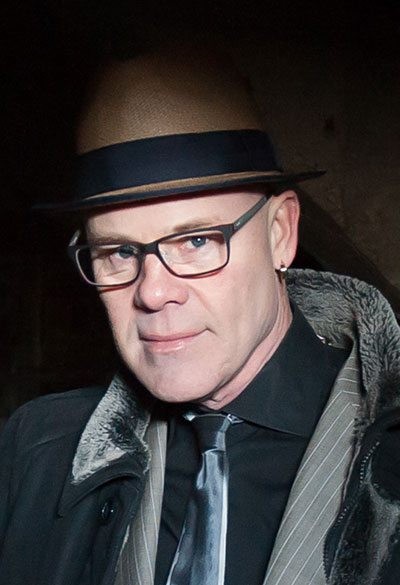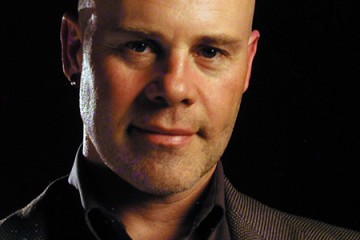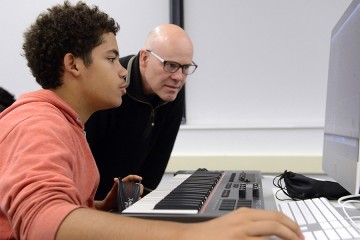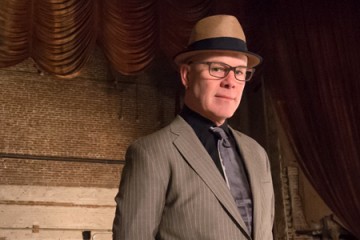Music innovator, tech trailblazer, author, and Johns Hopkins University faculty member Thomas Dolby will lead a new four-year undergraduate degree program, Music for New Media, at the Peabody Conservatory of the Johns Hopkins University,

Image caption: Thomas Dolby
Music for New Media, which is slated to enroll its first cohort of students in the fall 2018 semester, will combine studies in music, composition, programming, and visual media to prepare students for careers in new and emerging platforms such as computer games and virtual reality.
"This area of study is absolutely exploding with possibilities," said Dolby, who joined JHU as Homewood Professor of the Arts in 2014. "I'm excited to help Peabody shape Music for New Media into one of the premier programs of its kind, where students can develop the skills and creativity they'll need to capitalize on the tremendous opportunities out there in the workplace."
Peabody's Music for New Media program is designed for strong music students interested in composing and producing music for emerging areas of non-linear entertainment such as computer games, virtual reality, augmented reality, and 3D spatialized sound for location-based experiences. Students in the program will study the fundamentals of music's function within visual media, analyzing how and why music is used to enhance dramatic and emotional effect, and will learn to work in industry-standard interactive audio programming environments.
Individual capstone projects undertaken in the final year of the Bachelor of Music degree will take advantage of the wide spectrum of unique collaborations possible at Johns Hopkins University.
"The Music for New Media program builds on Peabody's strengths in composition and recording arts with new coursework which maps more directly to today's new media marketplace," said Abra Bush, Peabody's senior associate dean for institute studies. "We're delighted to be able to expand our curriculum in this direction and can't think of anyone better suited to lead the effort than Thomas Dolby."
An early MTV icon, Dolby blazed a trail for electronic music. His self-penned "She Blinded Me With Science" became a Top 5 Billboard hit the same year he co-wrote and produced the first ever platinum-selling rap 12" single, "Magic's Wand" by Whodini.
His synth playing and production on the recordings of Foreigner, Def Leppard, George Clinton, and Joni Mitchell have earned five Grammy nominations. He has appeared live with Stevie Wonder and Herbie Hancock, with David Bowie at LiveAid, and with Roger Waters at The Wall in Berlin, and has created original music for feature films produced by George Lucas, Steven Spielberg, and Ken Russell.
Dolby released four acclaimed albums in the first 10 years of his solo career. The last of these, 1992's Astronauts and Heretics, was one of the first major studio albums to be completely engineered using a Macintosh home computer.
In 1994, Dolby founded Headspace, Inc. and created the Beatnik audio engine, an early software synthesizer. The product was designed as a component for video games, and Dolby immediately saw its potential for use in early web browsers. While working with the founders of Netscape, Dolby licensed Beatnik to Sun Microsystems for use in the Java programming language. Beatnik came to the attention of Nokia engineers, who sought a sound solution for their mobile phones. Ultimately, ringtones proved the most robust market for the Beatnik audio engine, and by 2005 Dolby's technology was in more than half of the world's mobile phones.
Over two decades, Dolby adapted his musical vision to feature films, video games, and electronic sound technology. He has written scores for films by Ken Russell and Richard Brooks, and his music has been featured in dozens of films and television shows, from "Mission Impossible III" to "Breaking Bad."
Dolby served as musical director for the TED conferences from 2001 to 2012. In 2013, he toured the U.S. performing a live soundtrack to his award-winning documentary short, The Invisible Lighthouse, which he shot, scored, and edited himself. The film chronicles the closure of a 250-year-old lighthouse visible from his coastal home in Suffolk, England.
He recently released his first book, The Speed of Sound, a memoir that also explores the future of technology and music.
Posted in Arts+Culture
Tagged thomas dolby










